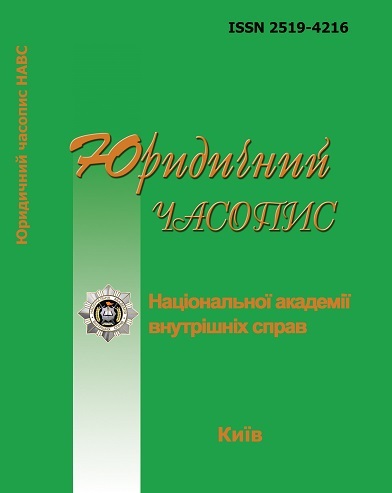The Current State of Legislative Regulation of the Housing Examination or Other Possessions of Persons by Secretly Penetrating them
Abstract
The present state of the legislative regulation of the survey of housing or other possession of a person through the secret penetration into them is explored. The national and international legislation at the legislative level, which regulates the examination of housing or other possession of a person by secretly penetrating them, is analyzed. Human rights and freedoms, in particular the right to property and private housing, are enshrined not only in national but also in international legal acts.
In accordance with national legislation, we can conclude that the survey of housing or other possession of a person through secret access to them is realized by the relevant actors in two forms: during operational and investigative measures and conducting an unconscious investigative (search) action. It is necessary to consider legal regulation depending on the type of operational-search or procedural activity.
It was concluded that at the legislative level only the right to inspect the dwelling or other possession of a person through secret access to them as a kind of secret investigative (search) actions and operational-search activities was fixed, however, organizational and tactical peculiarities of such activity were not disclosed.
Downloads
Abstract views: 70 PDF Downloads: 40
Copyright (c) 2018 Law Magazine of the National Academy of Internal Affairs

This work is licensed under a Creative Commons Attribution-NonCommercial-NoDerivatives 4.0 International License.
- Authors reserve the right to authorship of their own work and transfer to the magazine the right of the first publication of this work under the terms of the Creative Commons Attribution License, which allows other persons to freely distribute published work with mandatory reference to authors of the original work and the first publication of an article in this magazine.
- Authors have the right to enter into separate additional agreements on non-exclusive dissemination of the work in the form in which it was published in the journal (for example, to post an article in the institution's repository or to publish as part of a monograph), provided that the link to the first publication of the work in this journal is maintained.
- The journal's policy allows and encourages the posting of articles by authors on the Internet (for example, in electronic storehouses of institutions or on personal websites), both before the submission of this manuscript to the editorial office and during its editorial processing, as this contributes to the creation of a productive scientific discussion and positively affects the efficiency and dynamics of citing the published work.




